

Malala Yousafzai
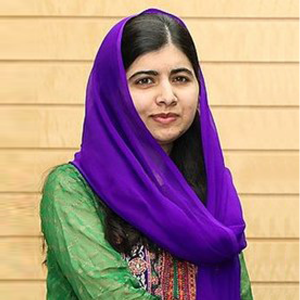
At age eleven, Malala Yousafzai was already advocating for the rights of women and girls. As an outspoken proponent for girls’ right to education, Yousafzai was often in danger because of her beliefs. However, even after being shot by the Taliban, she continued her activism and founded the Malala Fund with her father. By age seventeen, Yousafzai became the youngest person to receive the Nobel Peace Prize for her work.
Malala Yousafzai was born on July 12, 1997 in Mingora, Pakistan. Mingora is the largest city in the Swat Valley of the Khyber Pakhtunkhwa Province in Pakistan. Yousafzai was the first of three children born to Ziauddin and Tor Pekai Yousafzai. Although it was not always easy to raise a girl child in Pakistan, Malala Yousafzai’s father insisted that she received all of the same opportunities afforded to boy children. Her father was a teacher and education advocate that ran a girls’ school in their village. Due to his influence, Yousafzai was passionate about knowledge from a very young age, and she would often waddle into her father’s classes before she could even talk. However, by the time she was ten years old, Taliban extremists began to take control of the Swat Valley and many of her favorite things were banned. Girls were no longer able to attend school, and owning a television, playing music and dancing were all prohibited. Girl’s education was specifically targeted by the Taliban and by the end of 2008 they had destroyed over 400 schools. At eleven years old, Yousafzai decided to stand up to the Taliban.
Yousafzai started by blogging anonymously for the British Broadcasting Corporation (BBC) in early 2009. She used the penname, “Gul Makai,” and spoke about her life under Taliban rule and how much she wanted to attend school. Her first BBC diary entry entitled, “I Am Afraid,” detailed her nightmares about a full-blown war in her hometown. Her nightmares started to become reality, as Yousafzai and her family were soon forced to leave their home due to rising tensions between Pakistan and the Taliban. This did not stop Yousafzai from advocating for her right to attend school. Over the next few years, she and her father began speaking out on behalf of girls’ education in the media. They campaigned for Pakistani girls’ access to a free quality education. By 2011, Yousafzai was nominated for the International Children’s Peace Prize. Although she did not win, that same year she earned Pakistan’s National Youth Peace Prize. Yousafzai was now a household name. However, this also made her a target.
On October 9, 2012, fifteen-year old Yousafzai was on the bus returning from school with her friends. Two members of the Taliban stopped the bus and asked, “Who is Malala?” When they identified Yousafzai, they shot her in the head. Fortunately, she was airlifted to a Pakistani military hospital and then taken to an intensive care unit in England. After ten days in a medically induced coma, Yousafzai woke up in a hospital in Birmingham, England. She had suffered no major brain damage, but the left side of her face was paralyzed, and she would require many reparative surgeries and rehabilitation. After months of medical treatment, Yousafzai was able to return to her family that now lived in England. In March 2013, Yousafzai began attending school in Birmingham. Although she was now able to attend school in England, she decided to keep fighting “until every girl could go to school.” [1] On her sixteenth birthday, Yousafzai spoke at the United Nations in New York. That same year she published her autobiography entitled, “I Am Malala: The Girl Who Stood Up for Education and Was Shot by the Taliban.” She was awarded the Sakharov Prize for Freedom of Thought by the European Parliament for her activism.
In 2014, Yousafzai and her father established the Malala Fund to internationally support and advocate for women and girls. Through her charity, she met with Syrian refugees in Jordan, young women students in Kenya, and spoke out in Nigeria against the terrorist group Boko Haram that abducted young girls to stop them from going to school. In December of 2014, Yousafzai was awarded the Nobel Peace Prize for her work. At age seventeen, she became the youngest person to be named a Nobel laureate. Since then, Yousafzai has continued to advocate for the rights of women and girls. The Malala Fund advocates for quality education for all girls by funding education projects internationally, partnering with global leaders and local advocates, and pioneering innovative strategies to empower young women. Yousafzai is currently studying Philosophy, Politics and Economics at the University of Oxford.
[1] Yousafzai , Malala. “Malala's Story: Malala Fund.” Malala Fund. Accessed March 14, 2020. https://malala.org/malalas-story.
- Brenner, Marie. “Malala Yousafzai: The 15-Year-Old Pakistani Girl Who Wanted More from Her Country.” Vanity Fair. Vanity Fair, January 29, 2015. https://www.vanityfair.com/news/politics/2013/04/malala-yousafzai-pakistan-profile.
- The Nobel Foundation. “Malala Yousafzai: Biographical.” NobelPrize.org. Accessed March 14, 2020. https://www.nobelprize.org/prizes/peace/2014/yousafzai/biographical/
- Yousafzai, Malala, and Christina Lamb. I Am Malala: the Story of the Girl Who Stood Up for Education and Was Shot by the Taliban . London: Weidenfeld & Nicolson, 2013.
- Yousafzai , Malala. “Malala's Story: Malala Fund.” Malala Fund. Accessed March 14, 2020. https://malala.org/malalas-story.
Photo: Public domain.
MLA – Alexander, Kerri Lee. “Malala Yousafzai.” National Women’s History Museum, 2020. Date accessed.
Chicago – Alexander, Kerri Lee. “Malala Yousafzai.” National Women’s History Museum. 2020. www.womenshistory.org/education-resources/biographies/malala-yousafzai.
- BBC News. “Profile: Malala Yousafzai.” BBC, August 17, 2017. https://www.bbc.com/news/world-asia-23241937.
- Time Magazine. “Malala Yousafzai: 100 Women of the Year.” Time, March 5, 2020. https://time.com/5793780/malala-yousafzai-100-women-of-the-year/.
Related Biographies

Stacey Abrams

Abigail Smith Adams

Jane Addams

Toshiko Akiyoshi
Related background, “when we sing, we announce our existence”: bernice johnson reagon and the american spiritual', mary church terrell , belva lockwood and the precedents she set for women’s rights, women’s rights lab: black women’s clubs.

- Messengers of Peace
- Goodwill Ambassadors
- Former Messengers and Advocates
- Lazy Person’s Guide to Saving the World
- The United Nations Messengers of Peace
Malala Yousafzai
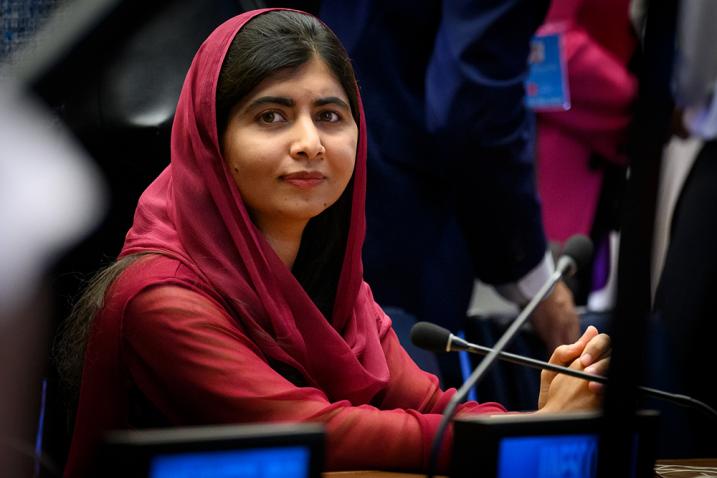
Malala Yousafzai became an international symbol of the fight for girls’ education after she was shot in 2012 for opposing Taliban restrictions on female education in her home country of Pakistan. In 2009, Malala had begun writing a blog under a pseudonym about the increasing military activity in her home town and about fears that her school would be attacked. After her identity was revealed, Malala and her father Ziauddin continued to speak out for the right to education. The Taliban’s attack on Malala on 9 October 2012 as she was returning home from school with her friends received worldwide condemnation. In Pakistan, over 2 million people signed a right to education petition, and the National Assembly ratified Pakistan's first Right to Free and Compulsory Education Bill. In 2013, Malala and her father co-founded the Malala Fund to bring awareness to the social and economic impact of girls' education and to empower girls to demand change. In December 2014, she became the youngest-ever Nobel Peace Prize laureate. Secretary-General António Guterres designated Malala as a United Nations Messenger of Peace in 2017 to help raise awareness of the importance of girl’s education.
FOCUS AREA: GIRLS’ EDUCATION
Quality education is the foundation for improving people’s lives and for sustainable development. Major progress has been made towards increasing access to education at all levels and increasing enrolment rates in schools, particularly for women and girls. The world has achieved equality in primary education between girls and boys. However, few countries have achieved that target at all levels of education. Moreover, 57 million children still remain out of school. Bolder efforts are needed to achieve universal education goals. In September 2015, at an historic UN Summit, world leaders adopted the 17 Sustainable Development Goals intended to mobilize efforts to end all forms of poverty, fight inequalities and tackle climate change. Goal 4 is aimed at ensuring inclusive and quality education for all and promoting lifelong learning. The targets for Goal 4 include eliminating gender disparities in education by 2030.
- Sustainable Development Goals (SDGs) - Quality Education - Goal 4
- Sustainable Development Goals (SDGs) - Gender Equality - Goal 5
- United Nations Children’s Fund (UNICEF)
- United Nations Educational, Scientific and Cultural Organization (UNESCO)
- Sustainable Development Goals (SDGs)
UNITED NATIONS
- Charter of the United Nations
- Essential UN
- Observances
OPPORTUNITIES
- Virtual Tours
- Internships
- Request a Speaker
ISSUES & CAMPAIGNS
- Global Issues
- COVID Response
- Sustainable Development Goals
- Climate Action
- Youth Engagement
- The Lazy Person's Guide To Saving The World
MEDIA RESOURCES
- UN Audiovisual Library
- United Nations Bookshop
Malala Yousafzai: Youngest Winner of Nobel Peace Prize
Drew Angerer / Getty Images
- Important Figures
- History Of Feminism
- Women's Suffrage
- Women & War
- Laws & Womens Rights
- Feminist Texts
- American History
- African American History
- African History
- Ancient History and Culture
- Asian History
- European History
- Latin American History
- Medieval & Renaissance History
- Military History
- The 20th Century
- B.A., Mundelein College
- M.Div., Meadville/Lombard Theological School
Malala Yousafzai, a Pakistani Muslim born in 1997, is the youngest winner of the Nobel Peace Prize , and an activist supporting the education of girls and women’s rights .
Earlier Childhood
Malala Yousafzai was born in Pakistan , born July 12, 1997, in a mountainous district known as Swat. Her father, Ziauddin, was a poet, educator, and social activist, who, with Malala’s mother, encouraged her education in a culture that often devalues the education of girls and women. When he recognized her keen mind, he encouraged her even more, talking politics with her from a very young age, and encouraging her to speak her mind. She has two brothers, Khusal Khan and Apal Khan. She was raised as a Muslim and was part of the Pashtun community.
Advocating Education for Girls
Malala had learned English by the age of eleven and was already by that age a strong advocate of education for all. Before she was 12, she began a blog, using a pseudonym, Gul Makai, writing of her daily life for BBC Urdu. When the Taliban , an extremist and militant Islamic group, came to power in Swat, she focused her blog more on the changes in her life, including the Taliban’s ban on education for girls , which included the closing of, and often physical destruction or burning of, over 100 schools for girls. She wore everyday clothing and hid her schoolbooks so that she could continue to attend school, even with the danger. She continued to blog, making clear that by continuing her education, she was opposing the Taliban. She mentioned her fear, including that she might be killed for going to school.
The New York Times produced a documentary that year about the destruction of girls’ education by the Taliban, and she began more avidly supporting the right of education for all. She even appeared on television. Soon, her connection with her pseudonymous blog became known, and her father received death threats. He refused to close the schools he was connected with. They lived for a while in a refugee camp. During her time in a camp, she met women's rights advocate Shiza Shahid, an older Pakistani woman who became a mentor to her.
Malala Yousafzai remained outspoken on the topic of education. In 2011, Malala won the National Peace Prize for her advocacy.
Her continued attendance at school and especially her recognized activism enraged the Taliban. On October 9, 2012, gunmen stopped her school bus and boarded it. They asked for her by name, and some of the fearful students showed her to them. The gunmen began shooting, and three girls were hit with bullets. Malala was injured the most severely, shot in the head and neck. The local Taliban claimed credit for the shooting, blaming her actions for threatening their organization. They promised to continue to target her and her family if she should survive.
She nearly died of her wounds. At a local hospital, doctors removed a bullet in her neck. She was on a ventilator. She was transferred to another hospital, where surgeons treated the pressure on her brain by removing part of her skull. The doctors gave her a 70% chance of survival.
Press coverage of the shooting was negative, and Pakistan’s prime minister condemned the shooting. Pakistani and international press were inspired to write more extensively about the state of education for girls, and how it lagged behind that of boys in much of the world.
Her plight was known worldwide. Pakistan’s National Youth Peace Prize was renamed the National Malala Peace Prize. Only a month after the shooting, people organized the Malala and the 32 Million Girls Day, to promote girls’ education.
Move to Great Britain
To better treat her injuries, and to escape the death threats to her family, the United Kingdom invited Malala and her family to move there. Her father was able to obtain work in the Pakistani consulate in Great Britain, and Malala was treated in a hospital there.
She recovered very well. Another surgery put a plate into her head and gave her a cochlear implant to offset the hearing loss from the shooting.
By March of 2013, Malala was back in school, in Birmingham, England. Typically for her, she used her return to school as an opportunity to call for such education for all girls worldwide. She announced a fund to support that cause, the Malala Fund , taking advantage of her worldwide celebrity to fund the cause she was passionate about. The Fund was created with the assistance of Angelina Jolie. Shiza Shahid was a co-founder.
In 2013, she was nominated for the Nobel Peace Prize and for TIME magazine’s Person of the Year but won neither. She was awarded a French prize for women’s rights, the Simone de Beauvoir Prize, and she made TIME’s list of 100 most influential people in the world.
In July, she spoke at the United Nations in New York City. She wore a shawl that had belonged to murdered Pakistani prime minister Benazir Bhutto . The United Nations declared her birthday “Malala Day.”
I Am Malala, her autobiography, was published that fall, and the now 16-year-old used much of the funds for her foundation.
She spoke in 2014 of her heartbreak at the kidnapping, just a year after she was shot, of 200 girls in Nigeria by another extremist group, Boko Haram, from a girls’ school
Nobel Peace Prize
In October of 2014, Malala Yousafzai was awarded the Nobel Peace Prize, with Kailash Satyarthi , a Hindu activist for education from India. The pairing of a Muslim and Hindu, a Pakistani and an Indian, was cited by the Nobel Committee as symbolic.
Arrests and Convictions
In September 2014, just a month before the Nobel Peace Prize announcement, Pakistan announced they had arrested, after a long investigation, ten men who had, under the direction of Maulana Fazullah, Taliban head in Pakistan, carried out the assassination attempt. In April 2015, the men were convicted and sentenced.
Continued Activism and Education
Malala has continued to be a presence on the global scene reminding of the importance of education for girls. The Malala Fund continues to work with local leaders to promote equal education, to support women and girls in getting an education, and in advocating for legislation to establish equal educational opportunities.
Several children’s books have been published about Malala, including in 2016 "For the Right to Learn: Malala Yousafzai’s Story."
In April 2017, she was designated a United Nations Messenger of Peace, the youngest so named.
She occasionally posts on Twitter, where she had by 2017 almost a million followers. There, in 2017, she described herself as “20 years old | advocate for girls’ education and women’s equality | UN Messenger of Peace | founder @MalalaFund.”
On September 25, 2017, Malala Yousafzai received the Wonk of the Year Award by American University and spoke there. Also in September, she was beginning her time as a college freshman, as a student at Oxford University. In typical modern fashion, she asked for advice on what to bring with a Twitter hashtag, #HelpMalalaPack.
- A List of Every Nobel Prize Winner in English Literature
- A List of Women With Nobel Peace Prizes
- Nobel Peace Prize Laureates From Asia
- Biography of Lucy Stone, Abolitionist and Women's Rights Reformer
- 10 Contemporary Biographies, Autobiographies, and Memoirs for Teens
- 21 Nobel Peace Prize Winners From the United States
- Wangari Maathai
- About Oslo City Hall in Norway
- Top 10 World News Stories of 2012
- How Many U.S. Presidents Have Won the Nobel Peace Prize?
- Biography of Gabriela Mistral, Chilean Poet and Nobel Prize Winner
- Biography of Harriet Martineau
- Alice Freeman Palmer, Wellesley College President
- Profile of Jane Addams, Social Reformer and Founder of Hull House
- Chien-Shiung Wu: A Pioneering Female Physicist
- Famous and Powerful Women of the Decade - 2000-2009
Biography Online

Malala Yousafzai Biography
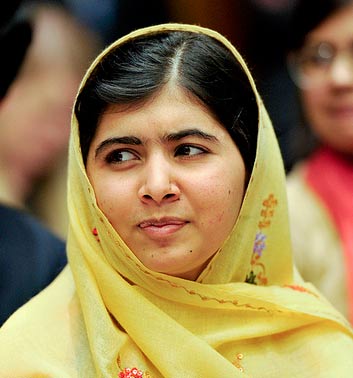
Early Life Malala
Malala was born (12 July 1997) in Mingora, the Swat District of north-west Pakistan to a Sunni Muslim family. She was named Malala, which means ‘grief-stricken’ after a famous female Pashtun poet and warrior from Afghanistan.
Her father, Ziauddin Yousafzai is a poet and runs a chain of public schools. He is a leading educational advocate himself. In 2009, Malala began writing an anonymous blog for the BBC expressing her views on education and life under the threat of the Taliban taking over her valley. It was her father who suggested his own daughter to the BBC. She wrote under the byline “Gul Makai.”
During this period, the Taliban’s military hold on the area intensified. At times, Malala reported hearing artillery from the advancing Taliban forces. As the Taliban took control of the area, they issued edicts banning television, banning music, and banning women from going shopping and limiting women’s education. Many girls schools were blown up and as a consequence pupils stayed at home, scared of possible reprisals from the Taliban. However, for a time, there was a brief respite when the Taliban stated girls could receive primary education if they wore Burkhas. But, a climate of fear prevailed, and Malala and her father began to receive death threats for their outspoken views. As a consequence, Malala and her father began to fear for their safety. Her father once considered moving Malala outside of Swat to a boarding school, but Malala didn’t want to leave.
” I don’t know why, but hearing I was being targeted did not worry me. It seemed to me that everybody knows they will die one day.” I am Malala p.188
When her father suggested they stop their campaigns for human rights, Malala replied
“How can we do that? You were the one who said that if we believe in something greater than our lives, then our voices will only multiply ever if we are dead. We can’t disown our campaign!’ I am Malala p.188 People were asking me to speak at events. How could I refuse saying there was a security problem? We couldn’t do that, especially not as proud Pashtuns. My father always said that heroism is in the Pastun DNA. I am Malala p.180
After the BBC blog had ended, Malala featured in a documentary made by New York Times reporter Adam B.Ellick. She also received greater international coverage, and her identity about writing the BBC blog was revealed. In 2011, she received Pakistan’s first National Youth Peace Prize, and she was nominated by Archbishop Desmond Tutu for the International Children’s Peace Prize. Her increased profile and strident criticism of the Taliban caused Taliban leaders to meet, and in 2012, they voted to kill her.
On 9 October 2012, a masked gunman entered her school bus and asked “Which one of you is Malala? Speak up. Otherwise, I will shoot at you all.”
Malala was identified and she was shot with a single bullet which went through her head, neck and shoulder. Two other girls were also injured, though not as badly as Malala.
Malala survived the initial shooting but was in a critical condition. Her father was convinced she would die and told the village to prepare for her funeral. Her critical organs were failing, and she developed an infection. In a coma, she was moved to a hospital in Rawalpindi. Later on the 15 October, she was transferred to Birmingham in the United Kingdom for further treatment at a specialist hospital for treating military injuries. A couple of days later, she came out of a coma and responded well to treatment. She was discharged on January 3, 2013, and moved with her family to a temporary home in the West Midlands. Writing in her book “I am Malala” she writes.
“It was a miracle I was alive” (p.237)
She also writes about her lack of bitterness or desire for revenge.
“My only regret was that I hadn’t had a chance to speak to them before they shot me. Now they’d never hear what I had to say. I didn’t even think a single bad thought about the man who shot me – I had no thoughts of revenge – I just wanted to go back to Swat. I wanted to go home” I am Malala p.237
Response to Assassination attempt
Her assassination received worldwide condemnation and protests across Pakistan. Over two million people signed the Right to Education campaign. The petition helped the ratification of Pakistan’s first right to education bill in Pakistan.
Ehsanullah Ehsan, chief spokesman for the Pakistani Taliban, claimed responsibility for the attack, saying that Yousafzai was a symbol of the infidels and obscenity. However, other Islamic clerics in Pakistan issued a fatwa against the Taliban leaders and said there was no religious justification for shooting a schoolgirl.
United Nations petition
On 15 October, UN Special Envoy for global education, Gordon Brown , visited Malala whilst she was in hospital and launched a petition in her name – ‘In support for what Malala fought for.’
Using the slogan “I am Malala” the petition contains three demands
- We call on Pakistan to agree to a plan to deliver education for every child.
- We call on all countries to outlaw discrimination against girls.
- We call on international organisations to ensure the world’s 61 million out-of-school children are in education by the end of 2015.
I am Malala – petition
On 12 July 2013, she spoke at the United Nations to a group of 500 youths calling for worldwide access to education.
“I am not against anyone, neither am I here to speak in terms of personal revenge against the Taliban or any other terrorist group. I’m here to speak up for the right of education for every child. I want education for the sons and daughters of the Taliban and all terrorists and extremists.” ( BBC Link of speech )
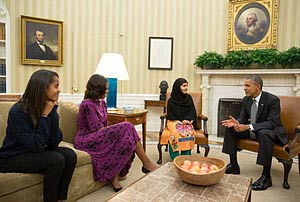
…I immediately saw images of Pakistanis fill my screen. Not the usual rock hurling Pakistanis, irrationally shouting amidst flaming tyres, but gentle candle-lighting, beautiful Pakistanis with words of love and peace on their lips. It was UN International day of the Girl Child and the BBC chose to illustrate this with a story of what they termed a National Awakening in Pakistan, following the shooting of 14-year-old school girl, Malala Yousafzai. I was delighted at the apparent 24 hour flip from a narrative of “those Pakistanis are so barbaric they shoot their own school girls” to one of hope, resilience, and a more accurate reflection of the millions who reject such an act. ( 5 February, 2013 )
Since 2013, she has studied at Edgbaston High School in Birmingham. She has continued to be a prominent activist based with her family living in Birmingham. In 2015, a documentary about Yousafzai was shortlisted for the Oscars ‘He Named Me Malala .’ In 2017, she began studying PPE at Lady Margaret Hall, Oxford University.
Further Quotes by Malala
“Today we all know education is our basic right. Not just in the West; Islam too has given us this right. Islam says every girl and everybody should go to school. In the Quran it is written, God wants us to have knowledge.” I am Malala p.263
“One child, one teacher, one pen and one book can change the world. Education is the only solution. Education first.”
– UN Speech, July 12, 2013
“I love my God. I thank my Allah. I talk to him all day. He is the greatest. By giving me this height to reach people, he has also given me great responsibilities. Peace in every home, every street, every village, every country – this is my dream. Education for every boy and every girl in the world. To sit down on a chair and read my books with all my friends at school is my right. To see each and every human being with a smile of happiness is my wish. I am Malala p 265 “I am Malala, My world has changed by I have not.” p.265
In October 2014, the Nobel committee awarded Malala the Nobel Peace Prize, they said:
“Despite her youth, Malala Yousafzai has already fought for several years for the right of girls to education and has shown by example that children and young people, too, can contribute to improving their own situations. “This she has done under the most dangerous circumstances. Through her heroic struggle she has become a leading spokesperson for girls’ rights to education.”
In 2020, Malala met environmental activist Greta Thunberg at Lady Margaret Hall, Oxford saying of Thunberg “The only friend I would miss school for.” Thunberg said of Malala “So… today I met my role model. What else can I say?”
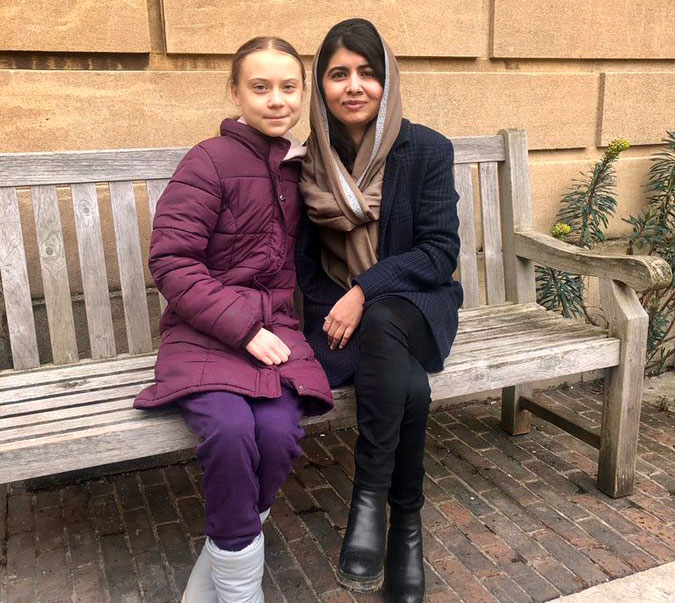
Citation: Pettinger, Tejvan . “Biography of Malala”, Oxford, UK. www.biographyonline.net. Last updated 5 March 2020. Originally published 18/10/2013.
I Am Malala
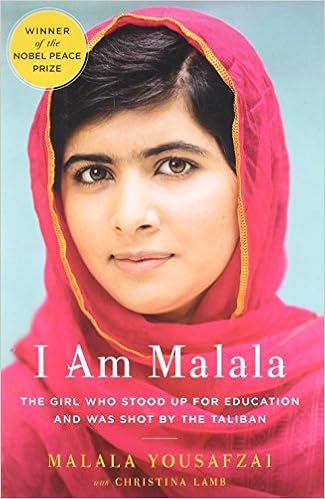
I Am Malala at Amazon
Related pages
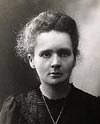
Photo Credits
- photo top: United Nations information
- photo middle: Malala at the Oval Office, with President Obama
- Photo bottom: Global partnership for education
- History Classics
- Your Profile
- Find History on Facebook (Opens in a new window)
- Find History on Twitter (Opens in a new window)
- Find History on YouTube (Opens in a new window)
- Find History on Instagram (Opens in a new window)
- Find History on TikTok (Opens in a new window)
- This Day In History
- History Podcasts
- History Vault
This Day In History : October 10
Changing the day will navigate the page to that given day in history. You can navigate days by using left and right arrows
Malala Yousafzai, 17, wins Nobel Peace Prize

On October 10, 2014, activist Malala Yousafzai, age 17, wins the Nobel Peace Prize . A fierce advocate for girls' education, in her native Pakistan and around the world, she is the youngest-ever Nobel laureate.
Malala Yousafzai was in chemistry class when she learned she had won the Nobel Peace Prize. After hearing the news, she recalled, "I went to my physics class. I said, I have to finish my school day, because when you get the Nobel Peace Prize for education, you have to finish your school day."
Born in Pakistan's Swat Valley, at the feet of the Hindu Kush mountains, Malala grew up attending a girls’ school run by her father in their village of Mingora. Ziauddin Yousafzai, who grew up with five sisters, believed in the fundamental importance of education for girls. In a 2014 TEDtalk , he said of his daughter, "Don't ask me what I did, ask me what I did not do. I did not clip her wings."
In 2008, the Taliban seized control of the Swat valley. As part of a campaign to impose their vision of fundamentalist Islam, they violently shuttered schools for girls, bombing campuses and threatening teachers, parents and students. Undeterred, 11-year-old Malala went with her father to a local press club in Peshawar, where she gave her first public speech, entitled “How Dare the Taliban Take Away My Basic Right to Education?” She began to pseudonymously publish an online diary of her life under the Taliban with the BBC. After the Taliban was pushed out of the Swat Valley in 2009, Malala continued her public campaign to increase access to schooling for Pakistani girls.
On October 9, 2012, Taliban fighters boarded the bus the 15-year-old activist was riding home from school and shot her in the head at point blank range. The bullet grazed her skull and jawbone, but miraculously, she survived. Malala underwent emergency surgery, first in Pakistan, and then at the Queen Elizabeth Hospital in Birmingham, U.K.
The assassination attempt shone a spotlight on Malala and her crusade, making her internationally famous. She spoke about her ordeal before the United Nations on July 12, 2013, saying , "They thought that the bullets would silence us. But they failed." She called on governments around the world to protect the rights of women and girls, and "to ensure free compulsory education for every child all over the world." That same year, she published the book I am Malala , which reached number three on the New York Times ' nonfiction bestseller list, and she launched The Malala Fund , to support the cause for girls’ education. The fund's first grant went to support the schooling of 40 girls in the Swat Valley.
In 2014, when 17-year-old Malala became the youngest-ever recipient of the Nobel Peace Prize, she declared in her acceptace speech: "This award is not just for me. It is for those forgotten children who want education. It is for those frightened children who want peace. It is for those voiceless children who want change. I am here to stand up for their rights, to raise their voice… It is not time to pity them... It is time to take action so it becomes the last time, the last time, so it becomes the last time that we see a child deprived of education."
She has since graduated with a degree in Philosophy, Politics and Economics from Oxford University.
Also on This Day in History October | 10
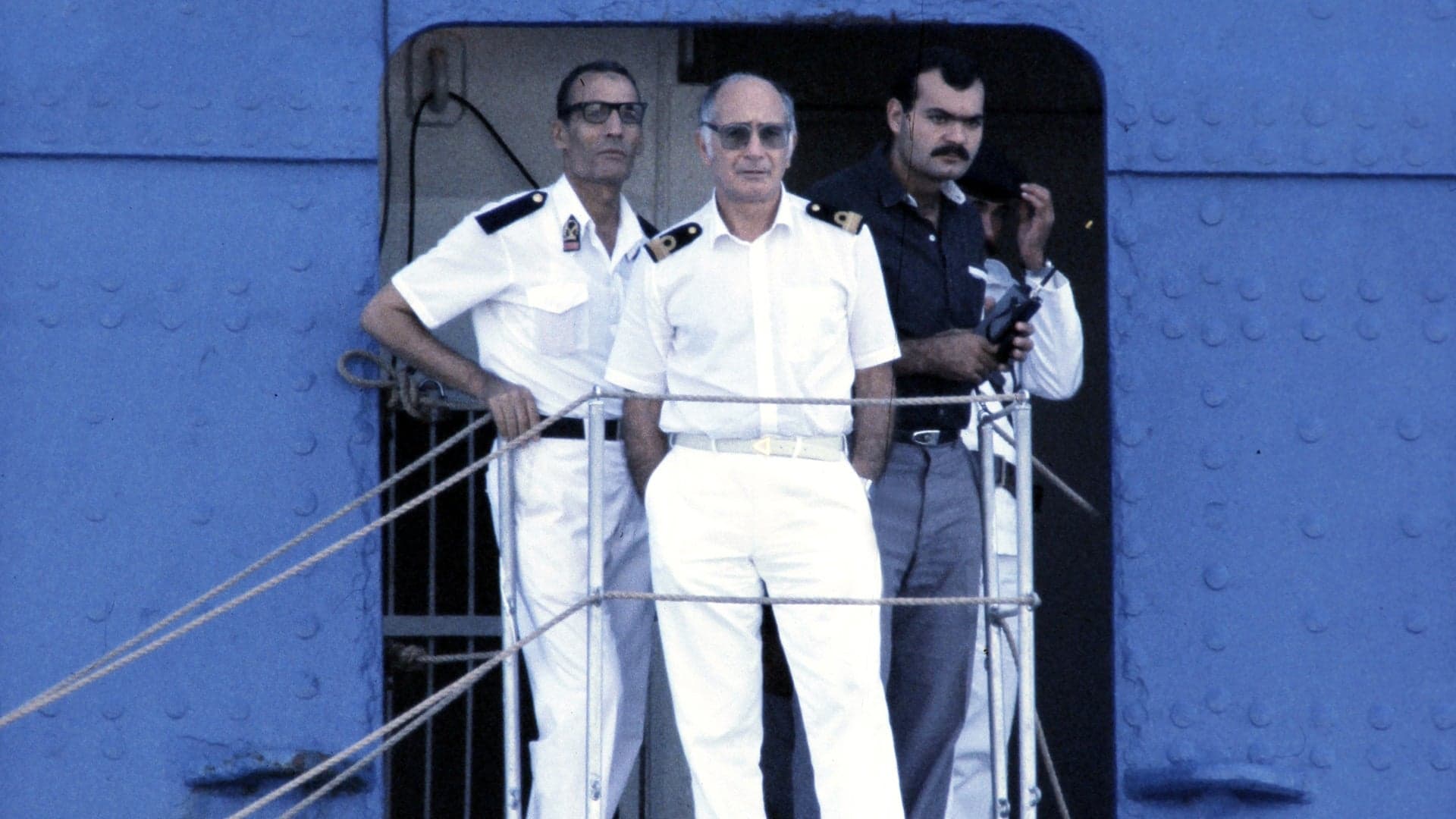
This Day in History Video: What Happened on October 10
Us naval academy opens, battle of tours, vice president agnew resigns, whitesnake’s “here i go again” tops the charts, us navy fighter jets intercept italian cruise ship hijackers.

Wake Up to This Day in History
Sign up now to learn about This Day in History straight from your inbox. Get all of today's events in just one email featuring a range of topics.
By submitting your information, you agree to receive emails from HISTORY and A+E Networks. You can opt out at any time. You must be 16 years or older and a resident of the United States.
More details : Privacy Notice | Terms of Use | Contact Us
Colonel George Custer’s funeral is held at West Point
“porgy and bess,” the first great american opera, premieres on broadway, superman christopher reeve dies at age 52, a former postal worker commits mass murder, president dwight d. eisenhower apologizes to african diplomat, william howe named commander in chief of british army, eight hundred children are gassed to death at auschwitz.
Malala Yousafzai: Nobel Peace Prize acceptance speech
"This award is not just for me. It is for those forgotten children who want education. It is for those frightened children who want peace. It is for those voiceless children who want change." {"content":{"data":{},"content":[{"data":{},"content":[{"data":{},"marks":[],"value":"\"This award is not just for me. It is for those forgotten children who want education. It is for those frightened children who want peace. It is for those voiceless children who want change.\"","nodeType":"text"}],"nodeType":"paragraph"}],"nodeType":"document"}}

Oslo, Norway
Bismillah hir rahman ir rahim. In the name of God, the most merciful, the most beneficent.
Your Majesties, Your royal highnesses, distinguished members of the Norwegian Nobel Committee,
Dear sisters and brothers, today is a day of great happiness for me. I am humbled that the Nobel Committee has selected me for this precious award.
Thank you to everyone for your continued support and love. Thank you for the letters and cards that I still receive from all around the world. Your kind and encouraging words strengthens and inspires me.
I would like to thank my parents for their unconditional love. Thank you to my father for not clipping my wings and for letting me fly. Thank you to my mother for inspiring me to be patient and to always speak the truth — which we strongly believe is the true message of Islam. And also thank you to all my wonderful teachers, who inspired me to believe in myself and be brave.
I am proud, well in fact, I am very proud to be the first Pashtun, the first Pakistani, and the youngest person to receive this award. Along with that, along with that, I am pretty certain that I am also the first recipient of the Nobel Peace Prize who still fights with her younger brothers. I want there to be peace everywhere, but my brothers and I are still working on that.
I am also honoured to receive this award together with Kailash Satyarthi, who has been a champion for children's rights for a long time. Twice as long, in fact, than I have been alive. I am proud that we can work together, we can work together and show the world that an Indian and a Pakistani, they can work together and achieve their goals of children's rights.
Dear brothers and sisters, I was named after the inspirational Malalai of Maiwand who is the Pashtun Joan of Arc. The word Malala means grief stricken "sad," but in order to lend some happiness to it, my grandfather would always call me Malala — "The happiest girl in the world" and today I am very happy that we are together fighting for an important cause.
This award is not just for me. It is for those forgotten children who want education. It is for those frightened children who want peace. It is for those voiceless children who want change.
I am here to stand up for their rights, to raise their voice… it is not time to pity them. It is not time to pity them. It is time to take action so it becomes the last time, the last time, so it becomes the last time that we see a child deprived of education.
I have found that people describe me in many different ways.
Some people call me the girl who was shot by the Taliban.
And some, the girl who fought for her rights.
Some people, call me a "Nobel laureate" now.
However, my brothers still call me that annoying bossy sister. As far as I know, I am just a committed and even stubborn person who wants to see every child getting quality education, who wants to see women having equal rights and who wants peace in every corner of the world.
Education is one of the blessings of life — and one of its necessities. That has been my experience during the 17 years of my life. In my paradise home, Swat, I always loved learning and discovering new things. I remember when my friends and I would decorate our hands with henna on special occasions. And instead of drawing flowers and patterns we would paint our hands with mathematical formulas and equations.
We had a thirst for education, we had a thirst for education because our future was right there in that classroom. We would sit and learn and read together. We loved to wear neat and tidy school uniforms and we would sit there with big dreams in our eyes. We wanted to make our parents proud and prove that we could also excel in our studies and achieve those goals, which some people think only boys can.
But things did not remain the same. When I was in Swat, which was a place of tourism and beauty, suddenly changed into a place of terrorism. I was just ten that more than 400 schools were destroyed. Women were flogged. People were killed. And our beautiful dreams turned into nightmares.
Education went from being a right to being a crime.
Girls were stopped from going to school.
When my world suddenly changed, my priorities changed too. I had two options. One was to remain silent and wait to be killed. And the second was to speak up and then be killed.
I chose the second one. I decided to speak up.
We could not just stand by and see those injustices of the terrorists denying our rights, ruthlessly killing people and misusing the name of Islam. We decided to raise our voice and tell them: Have you not learnt, have you not learnt that in the Holy Quran Allah says: if you kill one person it is as if you kill the whole humanity? Do you not know that Mohammad, peace be upon him, the prophet of mercy, he says, do not harm yourself or others."
And do you not know that the very first word of the Holy Quran is the word Iqra," which means "read"?
The terrorists tried to stop us and attacked me and my friends who are here today, on our school bus in 2012, but neither their ideas nor their bullets could win.
We survived. And since that day, our voices have grown louder and louder.
I tell my story, not because it is unique, but because it is not.
It is the story of many girls.
Today, I tell their stories too. I have brought with me some of my sisters from Pakistan, from Nigeria and from Syria, who share this story. My brave sisters Shazia and Kainat who were also shot that day on our school bus. But they have not stopped learning. And my brave sister Kainat Soomro who went through severe abuse and extreme violence, even her brother was killed, but she did not succumb.
Also my sisters here, whom I have met during my Malala Fund campaign. My 16-year-old courageous sister, Muzoon from Syria, who now lives in Jordan as refugee and goes from tent to tent encouraging girls and boys to learn. And my sister Amina, from the North of Nigeria, where Boko Haram threatens, and stops girls and even kidnaps girls, just for wanting to go to school.
Though I appear as one girl, though I appear as one girl, one person, who is 5 foot 2 inches tall, if you include my high heels. (It means I am 5 foot only) I am not a lone voice, I am not a lone voice, I am many.
I am Malala. But I am also Shazia.
I am Kainat.
I am Kainat Soomro.
I am Muzoon.
I am Amina.
I am those 66 million girls* who are deprived of education. And today I am not raising my voice, it is the voice of those 66 million girls.
We see many people becoming refugees in Syria, Gaza and Iraq. In Afghanistan, we see families being killed in suicide attacks and bomb blasts.
Many children in Africa do not have access to education because of poverty. And as I said, we still see, we still see girls who have no freedom to go to school in the north of Nigeria.
Many children in countries like Pakistan and India, as Kailash Satyarthi mentioned, many children, especially in India and Pakistan are deprived of their right to education because of social taboos, or they have been forced into child marriage or into child labour.
One of my very good school friends, the same age as me, who had always been a bold and confident girl, dreamed of becoming a doctor. But her dream remained a dream. At the age of 12, she was forced to get married. And then soon she had a son, she had a child when she herself was still a child — only 14. I know that she could have been a very good doctor.
But she couldn't, because she was a girl.
Her story is why I dedicate the Nobel Peace Prize money to Malala Fund, to help give girls quality education, everywhere, anywhere in the world and to raise their voices. The first place this funding will go to is where my heart is, to build schools in Pakistan — especially in my home of Swat and Shangla.
In my own village, there is still no secondary school for girls. And it is my wish and my commitment, and now my challenge to build one so that my friends and my sisters can go there to school and get quality education and to get this opportunity to fulfil their dreams.
This is where I will begin, but it is not where I will stop. I will continue this fight until I see every child, every child in school.
Dear brothers and sisters, great people, who brought change, like Martin Luther King and Nelson Mandela, Mother Teresa and Aung San Suu Kyi, once stood here on this stage. I hope the steps that Kailash Satyarthi and I have taken so far and will take on this journey will also bring change — lasting change.
My great hope is that this will be the last time, this will be the last time we must fight for education. Let's solve this once and for all.
We have already taken many steps. Now it is time to take a leap. It is not time to tell the world leaders to realise how important education is — they already know it — their own children are in good schools. Now it is time to call them to take action for the rest of the world's children.
We ask the world leaders to unite and make education their top priority.
Fifteen years ago, the world leaders decided on a set of global goals, the Millennium Development Goals. In the years that have followed, we have seen some progress. The number of children out of school has been halved, as Kailash Satyarthi said. However, the world focused only on primary education, and progress did not reach everyone.
In year 2015, representatives from all around the world will meet in the United Nations to set the next set of goals, the Sustainable Development Goals. This will set the world's ambition for the next generations.
The world can no longer accept, the world can no longer accept that basic education is enough. Why do leaders accept that for children in developing countries, only basic literacy is sufficient, when their own children do homework in Algebra, Mathematics, Science and Physics?
Leaders must seize this opportunity to guarantee a free, quality, primary and secondary education for every child.
Some will say this is impractical, or too expensive, or too hard. Or maybe even impossible. But it is time the world thinks bigger.
Dear sisters and brothers, the so-called world of adults may understand it, but we children don't. Why is it that countries which we call strong" are so powerful in creating wars but are so weak in bringing peace? Why is it that giving guns is so easy but giving books is so hard? Why is it, why is it that making tanks is so easy, but building schools is so hard?
We are living in the modern age and we believe that nothing is impossible. We have reached the moon 45 years ago and maybe will soon land on Mars. Then, in this 21st century, we must be able to give every child quality education.
Dear sisters and brothers, dear fellow children, we must work… not wait. Not just the politicians and the world leaders, we all need to contribute. Me. You. We. It is our duty.
Let us become the first generation to decide to be the last, let us become the first generation that decides to be the last that sees empty classrooms, lost childhoods, and wasted potentials.
Let this be the last time that a girl or a boy spends their childhood in a factory.
Let this be the last time that a girl is forced into early child marriage.
Let this be the last time that a child loses life in war.
Let this be the last time that we see a child out of school.
Let this end with us.
Let's begin this ending together, today, right here, right now. Let's begin this ending now. Thank you so much.
*Note: UNESCO now estimates more than 130 million girls around the world are out of school.
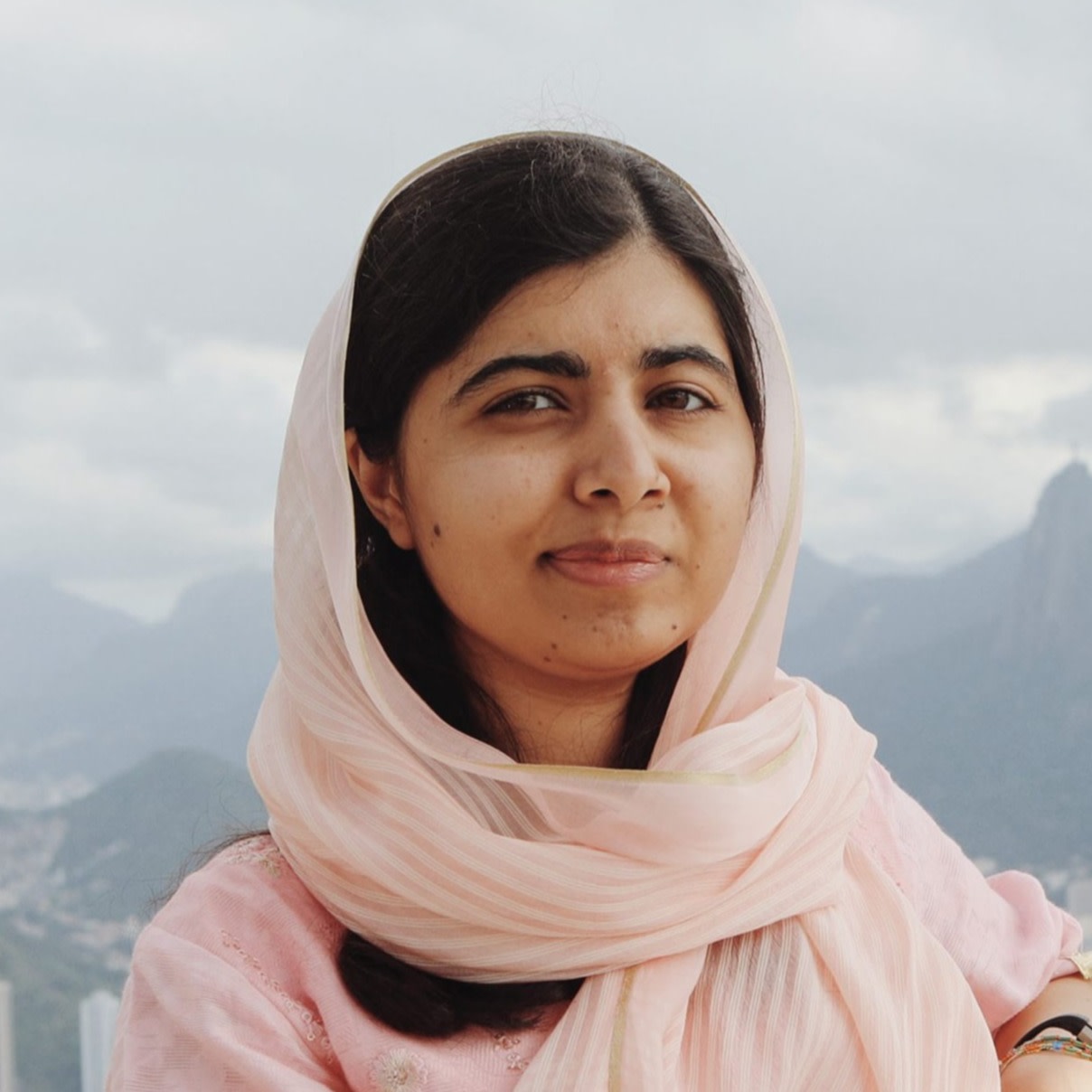
Malala Yousafzai is a Pakistani activist, student, UN messenger of peace and the youngest Nobel Laureate. As co-founder of Malala Fund, she is building a world where every girl can learn and lead without fear.
Related Posts
Malala yousafzai: 16th birthday speech at the united nations, sign up to learn how you can help support malala fund and receive the latest updates on our work..
- Climate Crisis
- Economy & Business
- Arts & Culture
- Bee my Future
- LifeGate PlasticLess
- Mobility Revolution
- Zero Impact
- Our History
- Company Info
- Terms and Conditions
Malala Yousafzai, a life spent fighting for the right to education
Malala Yousafzai became the youngest-ever Nobel Prize winner for her fight for the right to education. A biography of the ground-breaking Pakistani activist.
Born in Mingora, in Pakistan’s Swat Valley, Malala Yousafzai is a young woman who, since she was very young, has stood out for her commitment to achieving better rights to free and complete education for girls and young women. Malala’s father, Ziauddin Yousafzai , is an activist himself, co-founder and Board Member of Malala Fund and author of his daughter’s biography, Let Her Fly (published by Penguin, 2019).
Malala Yousafzai’s story
In 2012 , Malala Yousafzai survived an assassination attempt as an extremist militant, Ehsanullah Ehsan , shot her in the head with a firearm as she was stepping onto a school bus. The attack was immediately claimed by the Taliban, who wanted her eliminated as a symbol in the fight for education. After the tragic event, Yousafzai received medical care in the United Kingdom, where she remained to continue her studies.
In 2013, Yousafzai made a speech at the United Nations Youth Assembly in New York, during which she talked about the controversial situation surrounding women’s rights in her country. The event generated a wave of international attention thanks to the internet and interest from global media. Addressing the assembly, Yousafzai explained that education is the only solution to combat inequality.
One child, one teacher, one book, one pen can change the world. Malala Yousafzai
That same year, the first book about the young activist’s life story – I Am Malala – was published, written collaboratively by Yousafzai herself and Christina Lamb , an international journalist and Pakistan and Afghanistan expert.
In 2014, Yousafzai was awarded the Nobel Peace Prize alongside Indian children’s rights activist Kailash Satyarthi . At 14, Malala was the youngest-ever Nobel Prize recipient, but she already had her mind made up about her life goals. She expressed the desire to become Prime Minister of her country, with the aim of achieving the goal of ensuring the right to education for all children .
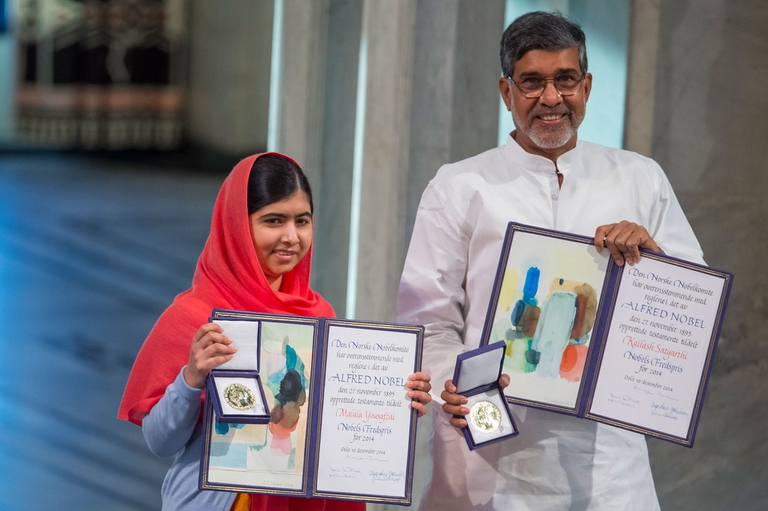
Following this event, Pakistan’s Prime Minister awarded Malala Yousafzai the first National Peace Prize , a recognition created specifically in her honour, which also included a cheque worth approximately 4,000 euro. Yousafzai, on this and other occasions, reiterated her will to create a political party and work towards improving the future for young women in her region.
Around the same time, the Taliban spokesperson , after having claimed the attack that took place in 2012, stated that Malala Yousafzai had been responsible for “obscenities” that had to be “stopped”. The young woman, a victim of these accusations, soon became one of the world’s most prominent and well-known civil rights activists.
You must speak the truth. The truth will abolish fear. from the book “I Am Malala”
International commitment to sustainable development
On 25th September 2015, together with many other representatives from the worlds of arts, politics, science, and culture, Malala Yousafzai became one of the ambassadors for the United Nations’ 17 Global Goals , also known as Sustainable Development Goals (SDGs), to be achieved by 2030.
The initiative involves many other activists and artists like Stevie Wonder, Kate Winslet, Bill and Melinda Gates, Queen Rania of Jordan, Jennifer Lopez, Meryl Streep, and many others. World leaders are committed to respecting the 17 Global Goals to be achieved within 15 years, including three of the most important: eliminating extreme poverty , combating inequality and injustice , and mitigating the emissions that cause climate change .
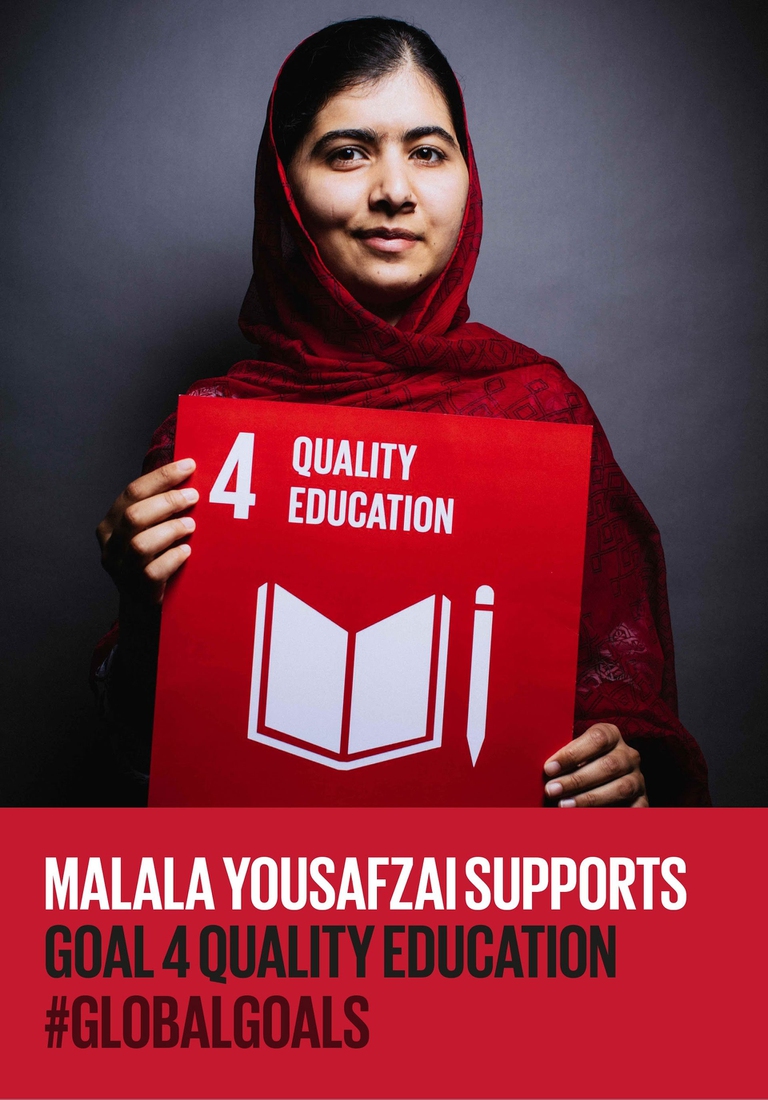
In 2017, after former US President Donald Trump signed a decree banning refugees and people from seven Muslim countries from entry into the United States, Malala Yousafzai chose to publicly voice her dissent. The decision by the US, a country that has historically welcomed and been a part of major migrations, was inconceivable, a truly callous way of turning its back on people whose only wish was to start a new life.
Malala Yousafzai graduated from Oxford University in June 2020, after having started a degree in Philosophy, Politics, and Economics in 2017. The subject matter seems perfectly aligned with her will to follow a path towards a political career.
On 8 March 2021, Apple announced a programming partnership with Malala Yousafzai for the creation of original content that will include dramas, comedies, documentaries, animated features, and shows for children that will allow the activist to use her ability to inspire people all over the world.
Malala Yousafzai threatened again
Recently, Yousafzai was once again threatened by the Taliban, this time on social media.
Next time, there will be no mistake. Ehsanullah Ehsan
This was the message in a February tweet by extremist militant Ehsanullah Ehsan , who had shot and gravely injured Malala in 2012. The social network subsequently removed the account that posted the threat.
The affair prompted Yousafzai to demand explanations from both the Pakistani Army and Prime Minister Imran Khan regarding how Ehsan evaded government custody. The jihadist had been arrested in 2017 but, in January 2020, he managed to escape from a building where he was being kept by Pakistan’s intelligence agency. The circumstances surrounding his arrest and escape are shrouded in mystery and are the object of controversy.
After his escape, Ehsan was able to be interviewed and communicate with Pakistani journalists using the same Twitter account that has now been suspended.
Despite this serious incident the activist has decided to continue her fight, and on 25th February she met with Swedish activist Greta Thunberg , a friend and fellow fighter in the international struggle for justice. This time, they spoke about the climate crisis and how it also affects fundamental human rights, like the right to education.
Malala Yousafzai’s life, devoted to the fight for civil rights , education , and women’s rights , seems to follow a winding path, filled with successes, international recognition, and strong, brave acts. This, however, also causes violent reactions from the Taliban groups that oppose her.
Despite this, Yousafzai is never afraid to tell the truth and fight for justice.
Translated by Patrick Bracelli
Siamo anche su WhatsApp. Segui il canale ufficiale LifeGate per restare aggiornata, aggiornato sulle ultime notizie e sulle nostre attività.
Read more on these topics: Human rights , Women's rights , Activism , Education
Research as a woman
A new travelling exhibition, which is being shown in various parts of the Andean country Ecuador, seeks to make the important work of Ecuadorian women scientists visible. Because women need science and science needs women.
The married couple empowering women and children in Nepal
Meet Gokul Subedi and Prakriti Mainali, the founders of two humanitarian organisations with one shared goal: to improve the lives of the most vulnerable and disadvantaged members of Nepalese society.
Muslim women in India are fighting for their right to wear a hijab
The Hijab ban has caused a major controversy in India after several Muslim girls were denied entry into a college for wearing the traditional headscarf.
Brazil Supreme Court suspends “case of the century” for Indigenous land rights
Brazil’s Supreme Federal Court has indefinitely shelved a case that was set to drastically alter indigenous land right claims, leaving its fate uncertain.
The heartbreaking lives of pigs raised for meat
Animal Equality reveals the brutality of Europe’s pig meat industry and illegal activities on farms for which many perpetrators haven’t yet been punished.
India’s Jenu Kuruba indigenous tribe protests forced evictions from the forest
Jenu Kuruba, a honey-collecting indigenous tribe of India, accuses the local government of forcefully evicting them from the forest that is their home.
No one needs the Istanbul Convention more than Turkey, but Erdoğan turns a blind eye
The state of women’s rights in Turkey is critical, and gender-based violence is increasing. The country’s withdrawal from the Istanbul Convention will only make matters worse.
One in three. Violence against women is a global pandemic
One in three women have suffered physical or sexual violence. With contributions from Europe, Africa, Asia and Latin America, we look at how this shadow pandemic affects every corner of the world.
10 things you need to know about the Istanbul Convention on violence against women
The Istanbul Convention against gender-based and domestic violence marks its tenth anniversary. We look at what it is, who its signatories are, and what the future might hold.
9 Facts You May Not Know About Malala Yousafzai

2. On October 9, 2012, Malala boarded a bus to advocate for Pakistani girls' education when the Taliban shot her in the head and neck. She was 15. She was not expected to survive her injuries.
3. It was almost two years to the day when Malala was shot that she was awarded the Nobel Peace Prize. She was 17 and the youngest recipient to receive it. She shared the distinguished award with Kailash Satyarthi, another children's rights activist.
4. Malala had plans to be a doctor but has now taken an interest in politics.
5. Because of the violent assassination attempt on Malala, Pakistan announced the creation of the very first Right to Education Bill.
6. To date, Malala has received over 40 awards and honors for her bravery and activism, including an honorary doctorate from the University of King's College in 2014 and a Grammy Award for Best Children's Album (for the audiobook I Am Malala: How One Girl Stood Up for Education and Changed the World ) in 2015.
7. When Malala turned 18, she opened an all-girls school for Syrian refugees, calling on leaders from around the world to provide "books not bullets."
8. In 2015 an asteroid was named in honor of Malala.
9. In April 2017 Malala became a UN Messenger of Peace.
Watch Next .css-smpm16:after{background-color:#323232;color:#fff;margin-left:1.8rem;margin-top:1.25rem;width:1.5rem;height:0.063rem;content:'';display:-webkit-box;display:-webkit-flex;display:-ms-flexbox;display:flex;}
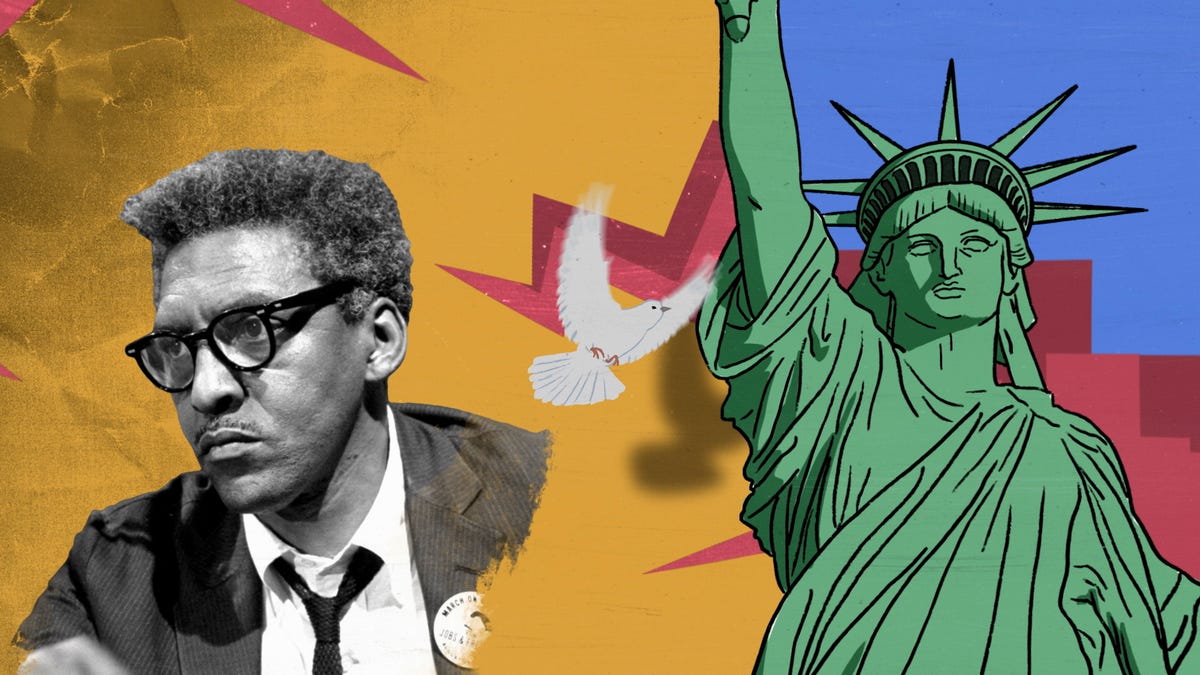
Womens Rights Activists
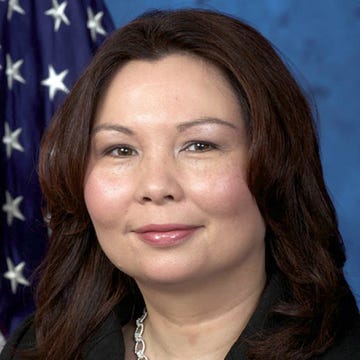
Christine de Pisan
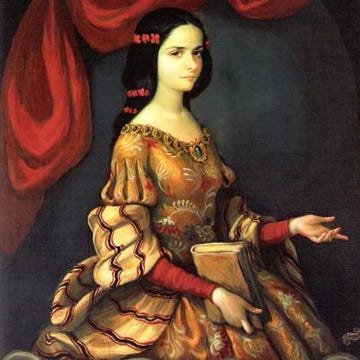
Sor Juana Inés de la Cruz
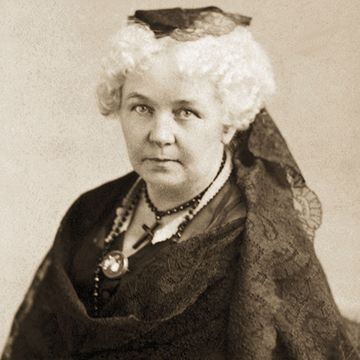
Elizabeth Cady Stanton
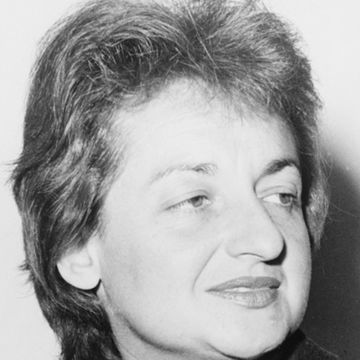
Betty Friedan
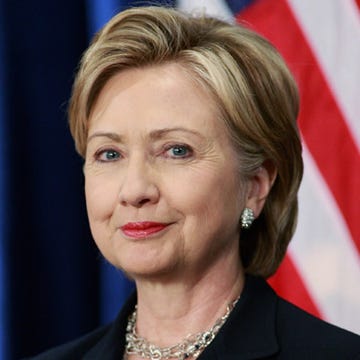
Hillary Clinton
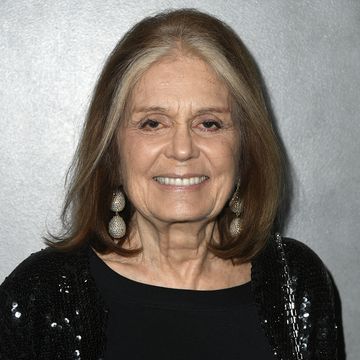
Gloria Steinem
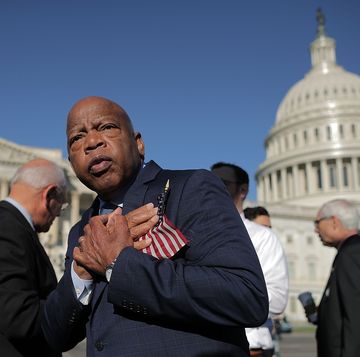
30 Civil Rights Leaders of the Past and Present
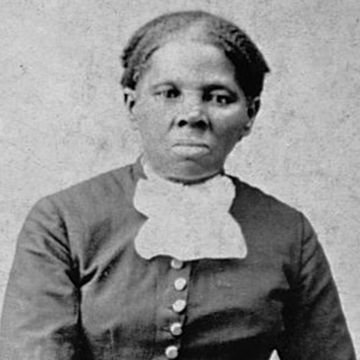
Harriet Tubman
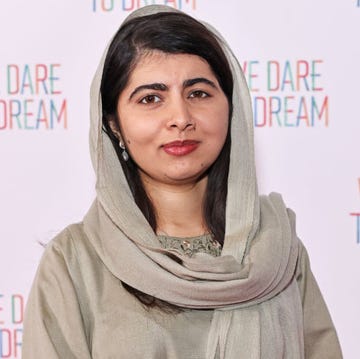
Malala Yousafzai
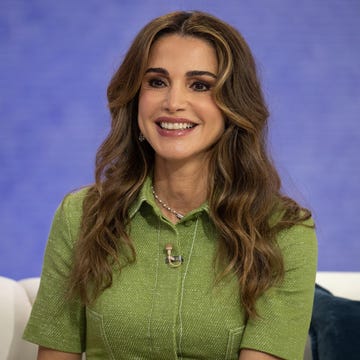
Queen Rania
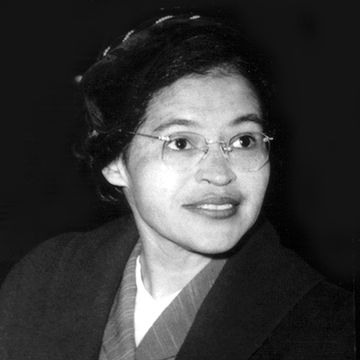
Malala Yousafzai
Malala Yousafzai ( Urdu : ملالہ یوسفزئی ; born 12 July 1997 ) is a Pakistani human rights and education activist who was jointly awarded the 2014 Nobel Peace Prize with Kailash Satyarthi , becoming its youngest recipient ever, at the age of 17.
- 1.1 Malala's diary, 2009
- 1.3 Inauguration of Library of Birmingham, Jan 2013
- 1.4 Statement to 32nd Congress of Pakistani Marxists, March 2013
- 1.5 UN speech, June 2013
- 1.6 BBC television interview, Oct 2013
- 1.7 Interview on CNN with Christiane Amanpour (October 11, 2013)
- 1.8 Statements in PBS interview with Margaret Warner (October 11, 2013)
- 1.9 Nobel Peace Prize Winner Speech (October 10, 2014)
- 1.10 Nobel Peace Prize Lecture (December 10, 2014)
- 2 Quotes about Yousafzai
- 3 External links
Quotes [ edit ]

Malala's diary, 2009 [ edit ]
- Malala. "I am afraid", Saturday 3 January 2009; Cited in: Malala Yousafzai: Portrait of the girl blogger , bbc.co.uk , 10 October 2012
- Malala. "I am afraid", Saturday 3 January 2009; Cited in: Diary of a Pakistani schoolgirl at news.bbc.co.uk . 19 January 2009
2010 - [ edit ]
- Malala in Interview with a Pakistani Television network, 2011-12; Cited in: The girl who wanted to go to school ." The New Yorker by Basharat Peer, posted October 10, 2012
- In: Brian Jones, " 16-Year-Old Malala Yousafzai Leaves Jon Stewart Speechless With Comment About Pacifism ," Business Insider, Oct. 9, 2013, 9:38 PM: from an interview on the Daily Show with Jon Stewart:
Inauguration of Library of Birmingham, Jan 2013 [ edit ]
- It is my dream that one day, great buildings like this one will exist in every corner of the world so every child can grow up with the opportunity to succeed.
- The content of a book holds the power of education and it is with this power that we can shape our future and change lives.
- There is no greater weapon than knowledge and no greater source of knowledge than the written word.
- Birmingham is very special for me because it is here that I found myself alive, seven days after I was shot... It is now my second home, after my beloved Pakistan.
- We must speak up for the children of Pakistan, India and Afghanistan who are suffering from terrorism, poverty, child labour and child trafficking. Let us help them through our voice, action and charity. Let us help them to read books and go to school. And let us not forget that even one book, one pen, one child and one teacher can change the world.
Statement to 32nd Congress of Pakistani Marxists, March 2013 [ edit ]
- Quoted on the website of the IMT : Statement to the 32nd congress of Pakistani Marxists
UN speech, June 2013 [ edit ]

- I don’t know where to begin my speech. I don’t know what people would be expecting me to say, but first of all thank you to God for whom we are equal and thank you to every person who has prayed for my fast recovery and new life.
- Thousands of people have been killed by the terrorists and millions have been injured. I am just one of them. So here I stand, one girl among many. I speak not for myself, but so those without a voice can be heard. Those who have fought for their rights. Their right to live in peace. Their right to be treated with dignity. Their right to equality of opportunity. Their right to be educated.
- Dear friends, on 9 October 2012, the Taliban shot me on the left side of my forehead. They shot my friends, too. They thought that the bullets would silence us, but they failed. And out of that silence came thousands of voices. The terrorists thought they would change my aims and stop my ambitions. But nothing changed in my life except this: weakness, fear and hopelessness died. Strength, power and courage was born. I am the same Malala. My ambitions are the same. My hopes are the same. And my dreams are the same. Dear sisters and brothers, I am not against anyone. Neither am I here to speak in terms of personal revenge against the Taliban or any other terrorist group. I am here to speak for the right of education for every child. I want education for the sons and daughters of the Taliban and all the terrorists and extremists. I do not even hate the Talib who shot me.
- Even if there was a gun in my hand and he was standing in front of me, I would not shoot him. This is the compassion I have learned from Mohamed , the prophet of mercy, Jesus Christ and Lord Buddha . This the legacy of change I have inherited from Martin Luther King , Nelson Mandela and Mohammed Ali Jinnah . This is the philosophy of nonviolence that I have learned from Gandhi , Bacha Khan and Mother Teresa . And this is the forgiveness that I have learned from my father and from my mother. This is what my soul is telling me: be peaceful and love everyone.
- Dear sisters and brothers, we realise the importance of light when we see darkness. We realise the importance of our voice when we are silenced.
- So let us wage a glorious struggle against illiteracy, poverty and terrorism, let us pick up our books and our pens, they are the most powerful weapons. One child, one teacher, one book and one pen can change the world. Education is the only solution.
BBC television interview, Oct 2013 [ edit ]
BBC television interview, Oct 2013; Quoted in: " I am no Western puppet: Malala ," at tribune.com, October 13, 2013
- My father says that education is neither Eastern or Western. Education is education: it's the right of everyone.
- The thing is that the people of Pakistan have supported me. They don't think of me as Western. I am a daughter of Pakistan and I am proud that I am a Pakistani.
- On the day when I was shot, and on the next day, people raised the banners of 'I am Malala'. They did not say 'I am Taliban'.
- They support me and they are encouraging me to move forward and to continue my campaign for girls' education.
Interview on CNN with Christiane Amanpour (October 11, 2013) [ edit ]
- I think that it's really an early age...I would feel proud, when I would work for education, when I would have done something, when I would be feeling confident to tell people, 'Yes! I have built that school; I have done that teachers' training, I have sent that (many) children to school'...Then if I get the Nobel Peace Prize, I will be saying, Yeah, I deserve it, somehow...I want to become a Prime Minister of Pakistan, and I think it's really good. Because through politics I can serve my whole county. I can be the doctor of the whole country...I can spend much of the money from the budget on education," she told It appears that becoming prime minister is a means to the end she has dedicated her life to...[in recalling when she got shot] He asked, 'Who is Malala?' He did not give me time to answer his question...He fired three bullets...One bullet hit me in the left side of my forehead, just above here, and it went down through my neck and into my shoulder...But still if I look at (it), it's a miracle...A Nobel Peace Prize would help me to begin this campaign for girls' education...But the real call, the most precious call, that I want to get and for which I'm thirsting and for which I want to struggle hard, that is the award to see every child to go to school, that is the award of peace and education for every child. And for that, I will struggle and I will work hard.
Statements in PBS interview with Margaret Warner (October 11, 2013) [ edit ]
- I think I have more plans for my future from now and I think we must start work for a campaign now so we have set up a Malala foundation. And through Malala fund we are going to educate girls and we want to do work on the ground: building schools, teachers, training, trying to motivate parents of the children to send their children to school. We also want to recognize those girls who are fighting for their rights. In the future when I grow older, much older I want to do politics. I want to serve my country for politics. I want to help my people and I want to help in education.
- First of all, my father inspired me...he is a great social activist and women's rights activist...he spoke out. And he spoke for women's rights...that hard situation, he inspired me, because he spoke. And that's what I learned from him.
- I think....living in such a hard situation when there are terrorists and they slaughter people every night is still hard -- is still a threat. So it's a better idea to speak out for your rights and then die...we will speak out for our rights. This is what we can do, and we tried our best.
Nobel Peace Prize Winner Speech (October 10, 2014) [ edit ]

- I’m feeling honored that I am being chosen as a Nobel laureate and I have been honored with this – this precious award, the Nobel Peace Prize. And I’m proud that I’m the first Pakistani and the first young woman or the first young person who is getting this award. It’s a great honor for me. And I’m also really happy that I’m sharing this award with a person – with a person from India whose name is Kailash Satyarthi and his great work for child’s right, his great work against – against child slavery .
- Totally inspires me and I am really happy that there are so many people who are working for children’s right and I’m not alone. And he totally deserved this award. So I am feeling honored that I’m sharing this award with him. He received this award and we both are the two Nobel award receivers, one is from Pakistan, one is from India, one believes in Hinduism, one strongly believes in Islam. And it gives a message to people – it gives a message to people of love between Pakistan and India and between – between different religions and we both support each other.
- It does not matter what’s the color of your skin, what language do you speak, what religion you believe in. It is that we should all consider each other as human beings and we should respect each other and we should all fight for our rights, for the rights of children, for the rights of women and for the rights of every human being.
- A girl has the power to go forward in her life. And she’s not only a mother, she’s not only a sister, she’s not only a wife. But a girl has the – she should have an identity. She should be recognized and she has equal rights as a boy.
- [T]hrough my story I want to tell other children all around the world that they should stand up for their rights. They should not wait for someone else and their voices are more powerful. Their voices – it would seem that they are weak, but at the time when no one speak, your voice gets so loud that everyone has to listen to it. Everyone has to hear it. So it’s my message to children all around the world that they should stand up for their rights.
Nobel Peace Prize Lecture (December 10, 2014) [ edit ]

- This award is not just for me. It is for those forgotten children who want education. It is for those frightened children who want peace. It is for those voiceless children who want change. I am here to stand up for their rights, raise their voice ... it is not time to pity them. It is time to take action so it becomes the last time that we see a child deprived of education.
- Education is one of the blessings of life — and one of its necessities.
- Sometimes people like to ask me why should girls go to school, why is it important for them. But I think the more important question is why shouldn't they, why shouldn't they have this right to go to school.
- The world can no longer accept, the world can no longer accept that basic education is enough. Why do leaders accept that for children in developing countries, only basic literacy is sufficient, when their own children do homework in Algebra, Mathematics, Science and Physics?
- Why is it that countries which we call strong" are so powerful in creating wars but are so weak in bringing peace? Why is it that giving guns is so easy but giving books is so hard? Why is it, why is it that making tanks is so easy, but building schools is so hard?
Quotes about Yousafzai [ edit ]
- Dolores Huerta "Reflections on Revolutionary Women" in Revolutionary Women of Texas and Mexico by Kathy Sosa (2020)
- Ban Ki-moon , as quoted in Malala celebrates 16th birthday with UN adress , Big Story (12 July 2013)
- Ban Ki-moon , " Statement on the Awarding of the Nobel Prize for Peace to Malala Yousafzai and Kailash Satyarthi " in un.org, 10 October 2014.
- Nobel Committee, " Official announcement of The Nobel Peace Prize for 2014 ," at nobelprize.org, 10 October 2014.
- Barack Obama , " Statement by the President on Malala Yousafzai and Kailash Satyarthi Winning the 2014 Nobel Peace Prize " at whitehouse.gov, 10 October 2014.
External links [ edit ]
- Malala Fund
- [ https://cambridgealert.com/facts-on-malala-yousafzai/
- 1997 births
- Living people
- Human rights activists
- Children's rights activists
- Women's rights activists
- Women authors
- Marxist feminists
- Islamic socialists
- Islamic feminists
- Muslims from Pakistan
- Nobel Peace Prize laureates
- Bloggers from Pakistan
- Memoirists from Pakistan
- Education activists
- Pakistani feminists
- Nobel laureates from Pakistan
- Activists from Pakistan
- Women from Pakistan
- Women activists
- Women born in the 1990s
- People who are first to
Navigation menu

IMAGES
VIDEO
COMMENTS
Malala Yousafzai, Pakistani activist who, while a teenager, spoke out against the Tehrik-e-Taliban Pakistan's ban on the education of girls. She gained global attention when she survived an assassination attempt at age 15. In 2014 Yousafzai won a share of the Nobel Prize for Peace, becoming the youngest Nobel laureate.
Learn about the life and work of Malala Yousafzai, the Pakistani girls' education activist who survived a Taliban attack and became the youngest Nobel Peace Prize laureate. Explore her early activism, recovery, books, awards, and recent projects.
— Malala Yousafzai, 24 January 2009 BBC blog entry In February 2009, girls' schools were still closed. In solidarity, private schools for boys had decided not to open until 9 February, and notices appeared saying so. On 7 February, Yousafzai and her brother returned to their hometown of Mingora, where the streets were deserted, and there was an "eerie silence". She wrote in her blog: "We ...
We would like to show you a description here but the site won't allow us.
Learn about the life and achievements of Malala Yousafzai, the youngest Nobel Peace Prize laureate and education activist. From her childhood in Pakistan to her recovery in England and her global campaigns, discover how she fought for girls' rights and survived the Taliban attack.
Learn how Malala Yousafzai survived a Taliban attack and became the youngest Nobel Peace Prize winner for her fight for girls' education. Discover how she founded Malala Fund and works with local partners to empower girls around the world.
Malala Yousafzai Biographical . M alala Yousafzai was born on July 12, 1997, in Mingora, the largest city in the Swat Valley in what is now the Khyber Pakhtunkhwa Province of Pakistan. She is the daughter of Ziauddin and Tor Pekai Yousafzai and has two younger brothers. At a very young age, Malala developed a thirst for knowledge.
Malala Yousafzai became an international symbol of the fight for girls' education after she was shot in 2012 for opposing Taliban restrictions on female education in her home country of Pakistan ...
Malala Yousafzai was awarded the Nobel Peace Prize for her fight for the right of every child to receive an education. She was born in the Swat Valley in Pakistan. When the Islamic Taliban movement took control of the valley in 2008, girls' schools were burned down. Malala kept a diary of the events, which was published in 2009 by BBC Urdu.
Malala Yousafzai, Pakistani activist who, while a teenager, spoke out against the Tehrik-e-Taliban Pakistan's ban on the education of girls. She gained global attention when she survived an assassination attempt at age 15. In 2014 Yousafzai won a share of the Nobel Prize for Peace, becoming the youngest Nobel laureate.
In Malala Yousafzai: Shooting and Nobel Peace Prize …Times), Yousafzai coauthored a memoir, I Am Malala: The Girl Who Stood Up for Education and Was Shot by the Taliban (2013). She also wrote the picture book Malala's Magic Pencil (2017), which was based on her childhood. In 2014 she became the youngest person to win the Liberty Medal,… Read More
Learn about the life and activism of Malala Yousafzai, a Pakistani Muslim who survived a Taliban assassination attempt and became the youngest Nobel Peace Prize laureate. Discover how she advocates for girls' education and women's rights worldwide.
Learn about the life and achievements of Malala Yousafzai, the Pakistani schoolgirl and Nobel Peace Prize winner who survived a Taliban assassination attempt. Read about her early activism, her recovery, her global campaigns and her challenges in Pakistan.
Learn how Malala Yousafzai, a Pakistani girl who survived a Taliban attack, became the youngest Nobel Peace Prize laureate for her campaign for girls' education. Read about her life, achievements and challenges in this article from HISTORY.
Introduction. (born 1997). While a teenager, Pakistani activist Malala Yousafzai spoke out publicly against a ban on the education of girls. She gained global attention when she survived an assassination attempt at age 15. In 2014 Yousafzai was awarded the Nobel Prize for Peace for her efforts on behalf of children's rights.
Malala Yousafzai is a young Pakistani activist. In 2008 she began to protest the closing of girls' schools in her area. In 2012 she was shot as a result of her protests. Yousafzai survived the assassination attempt and spoke all over the world about the importance of the education of girls.
Malala Yousafzai (born 12 July 1997 [1]) is a Pakistani student and an impactful education activist. She is known for her activism for girls ' and women's rights, especially for her campaign to allow girls to go to school. She was a victim of a gunshot attack in October 2012. [2] Yousafzai is the youngest person to have won the Nobel Peace Prize.
Read the full text of Malala Yousafzai's speech when she received the Nobel Peace Prize in 2014. She shares her story of fighting for education and peace, and honors her sisters who also face violence and oppression.
Jacqui Rossi talks about the accomplished life of young Malala Yousafzai, an education advocate and survivor of an assassination attempt by the Taliban. #Bi...
Learn about the life and achievements of Malala Yousafzai, the Pakistani activist who survived a Taliban attack and became the youngest Nobel Peace Prize laureate for her fight for education. Discover her books, her role as a UN ambassador, her political aspirations, and her latest threats.
Learn about the life and achievements of Malala Yousafzai, the youngest Nobel Peace Prize winner and a global advocate for girls' education. Discover her pseudonym, her near-death experience, her school for Syrian refugees and more.
Malala Yousafzai ( Urdu: ملالہ یوسفزئی; born 12 July 1997) is a Pakistani human rights and education activist who was jointly awarded the 2014 Nobel Peace Prize with Kailash Satyarthi, becoming its youngest recipient ever, at the age of 17.